- Home
- Sue Grafton
Q Is for Quarry Page 3
Q Is for Quarry Read online
Page 3
It was a testimony to loyal patrons that for months they'd continued to tromp across this malodorous earth, endured delays and inconveniences, suffered picketers, public warnings, posted notices, fumes, muddy shoes, and the occasional pratfall just to get to their daily drinks. The parking lot was now fenced off and the path to the front door consisted of a narrow walkway of two-by-four planks laid out end to end. Approaching the establishment, I felt like a gymnast teetering on the balance beam before an ill-timed dismount.
The red neon sign that hung above the entrance still hissed and sizzled like a backyard bug light, and the air wafting out smelled of cigarette smoke and com tortillas fried in last week's lard. A shrieking duet of blender motors was accompanied by castanets of clattering ice cubes being whirled together with tequila and Margarita mix. The Caliente Cafe opens at 6:00 every morning and doesn't shut down until 2:00 A.M. Its further virtue is that it's located just outside the city limits and thus provides an ever-present refuge for off-duty police officers who need to unwind at the end of a hard day-or after lunch, or after breakfast.
As I crossed the threshold, I confess I was hoping to run into a Santa Teresa vice cop named Cheney Phillips. Our long acquaintance had never progressed as far as romance – he had a girlfriend, for one thing – but one could always hope. Rumor had it the two of them had split up, so I figured it wouldn't hurt to put in an appearance.
Part of what sparked my interest was the fact I hadn't heard from Robert Dietz in months. He's a semiretired private eye who worked as my bodyguard in 1983 when a cut-rate hit man was hired to rub me out. Our connection since then has been intense and sporadic, with long, inexplicable intervals between visits. Only two weeks before, I'd called him in Carson City, Nevada, and left a message on his machine. So far, he hadn't bothered to call me back, which meant he was either out of the country or had moved on to someone new. Though I was crazy about Dietz, I'd never thought of him as my beau, my steady, my significant other, or my main squeeze (whatever the hell that is). Oh sure, Dietz and I had fooled around some over the past four years, but there was no commitment between us and no promises on either part. Naturally, I was irked at his neglect, even though I was equally at fault.
I caught sight of Dolan at the bar. He was wearing a worn brown leather bomber jacket. I paused for a moment to scope out the crowd and saw his gaze slide in my direction. Dolan's been a cop for too many years not to keep an eye on his surroundings, perpetually scanning faces in hopes of a match for one of the mug shots that had once crossed his desk. Off duty or on, no cop can resist the notion of a wholly unexpected felony arrest."
He raised a hand in greeting and I steered a course toward him, threading my way among parties waiting for tables. The stools on either side of him were occupied, but he gave the guys a look and one of them stood up to make room for me. I placed my shoulder bag at my feet and perched on the stool next to his. The ashtray in front of him was thick with butts, and it didn't take any of my highly developed detecting skills to note the number of cigarettes he'd smoked, including the one he was in the process of lighting from the still lit. He was drinking Old Forrester and he smelled like a Christmas fruitcake, minus the dried Maraschino cherries. He was also snacking on a plate of poppers: batter-fried jalapeno peppers filled with molten cheese. I thought I'd avoid pointing out the continuing error of his ways. There's nothing more obnoxious than someone calling attention to our obvious failings."
I said, "I thought I might run into Cheney Phillips. Have you seen him?"
"I think he's in Vegas on his honeymoon."
"His honeymoon? I thought the two of them broke up."
"This is someone new, a gal he met in here five or six weeks ago."
"You're kidding."
"Afraid not. Anyway, forget him. He's not your type anyway."
"I don't have a type. Of course, I don't have a boyfriend either, but that's beside the point."
"Have a popper."
"Thanks." I took one and bit into it, experiencing the spurt of melted cheese before the heat of the jalapeno set my tongue aflame. The jukebox came to life, and I peered over my shoulder as the strains of a country-western melody line-danced its way across the room. The Wurlitzer was ancient, a chunky, round-bodied contraption with a revolving rainbow of hues, bubbles licking up along its seams.
I turned my attention back to Dolan, trying to figure out how much he'd had to drink. He wasn't slurring his words, but I suspected he was so conditioned by his own alcoholic intake that he'd show no signs of drunkenness even if he fell off his stool. I wasn't sure if he'd been drinking continuously since lunchtime or had gone home for a nap between cocktails. A glance at the clock showed it was only 7:35, but he might have been sitting there since 4:00 P.M. I didn't look forward to working with the man if he was going to be pie-eyed from day to day. His constant smoking didn't appeal to me, either, but there was nothing I could do about it so the less said the better. "How's Stacey doing? Have you talked to him yet?"
"I called him at six and said we'd stop by to see him. Guy's sick of being poked and prodded, really wants out of there. I guess they'll release him tomorrow once the test results are back."
"Did you tell him your idea?"
"Briefly. I said we'd fill him in when we got there. What'd you think about the case?"
"I really love all that stuff. I usually don't have the chance to see police reports up close."
"Procedure hasn't changed that much the past twenty years. We're better at it now – more thorough and systematic, plus we got new technology on our side."
The bartender ambled our way. "What can I get for you?"
"I'm fine," I said.
Dolan lifted his whiskey glass, signaling for a refill.
"Aren't we on our way to see Stacey?"
"Right now?"
"Well, there's no point in getting into this if he's not going to agree."
I could see Dolan debate his desire for the next drink versus his concern for his friend. He pushed his glass back, reached for his wallet, and pulled out a handful of bills, which he tossed on the bar. "Catch you later."
I grabbed my bag and followed him as he headed for the door. "We'll take my car," he said.
"What if you want to stay longer than I do? Then I'm stuck. Let's take both cars and I'll follow. That way, I can peel off any time it suits."
We wrangled a bit more but he finally agreed. I was parked half a block down, but he dutifully waited, pulling out just ahead of me as I came up on his left. His driving was surprisingly sedate as we cruised out the 101 in our minimotorcade. I knew if he got stopped and breathalyzed, he'd easily blow over the legal limit. I kept an eye out for cops, half-forgetting that Dolan was a cop himself.
Once close to St. Terry's, we found street parking within two cars of each other on the same block of Castle. It was now fully dark and the hospital was lit up like a lavish resort. We went in through the rear entrance and took the elevator to 6 Central, the oncology floor. The lights had been dimmed, and the wide, carpeted corridor muffled our footsteps. Three spare IV poles and two blood pressure monitors were clustered against the wall, along with a linen cart, a multitiered meal cart filled with trays from the dinner served earlier. I caught sight of a few visitors, but there was none of the lively interplay between patients and family members. Getting well takes work and no one wants to waste energy on superficial conversation. Passing the nurses' station, Dolan gave a nod to the clerk at the desk.
Stacey was in a private room, looking out on a darkened residential street. He seemed to be sleeping, his hospital bed elevated at a forty-five-degree angle. Poking out from under his red-knit watch cap were wisps of ginger-colored hair. Two get-well cards were propped upright along the wide windowsill, but there was nothing else of a personal nature. The television screen was blank. On his rolling bed table, there were a pile of magazines and a paper cup filled with melting ice.
Dolan paused in the doorway. Stacey's eyes came open. He waved and then p
ushed himself up on the bed. "I see you made it," he said, and then to me, "You must be Kinsey. Nice to meet you." I leaned forward and shook his hand. His grip was strong and hot, almost as though he were metabolizing at twice the normal rate.
While Dolan went about the business of rounding up chairs from opposite comers of the room, I said, "I believe you knew the guys who trained me – Morley Shine and Ben Byrd."
"I knew them well. Both good men. I was sorry to hear about Morley's murder. That was a hell of a thing. Have a seat."
"Thanks."
Dolan offered me one chair and settled in the other. While the two of them chatted, I studied Stacey. He had small mild blue eyes, pale brows, and a long deeply creased face. His color was good, though it looked as though he hadn't shaved for days. He seemed to be in good spirits and he spoke with all the vigor of an active man.
After some preliminary conversation, Dolan brought the subject around to the Jane Doe investigation. "I gave Kinsey the file to read. We thought we should talk about where we go from here. The doc still talking about letting you out tomorrow?"
"Looks that way."
The two of them chatted about the case while I kept my mouth shut. I don't know why I'd expected Stacey to resist Dolan's proposition, but he didn't seem at all opposed to our resurrecting the case. He said to Dolan, "Speaking of which, Frankie Miracle got out. His parole officer, Dench Smallwood, called me and said Frankie found a place in town. By now, he probably has legitimate employment."
"That'd be a first."
I said, "How does Frankie Miracle fit in? I remember his name from the file."
Dolan said, "He got picked up in Lompoc August 1, two days before Jane Doe's body was found. We always figured he was good for it, though he denied it."
Stacey spoke up. "He killed his girlfriend in Venice July 29 during a meth binge. He stabbed the woman umpteen times, then he helped himself to her car, and all her credit cards and started driving north. She was found a couple days later when neighbors complained about the smell."
"Dumb-ass signed her name to the charge slips every time he stopped for gas," Dolan said. "You'd think someone would notice a 'Cathy Lee Pearse' with no boobs, a mustache, and a two-day growth of beard." He shifted in his chair and then rose to his feet. "You two go on and get acquainted. Time for me to step outside and grab a smoke."
Once Dolan left, I said, "You have a theory why Jane Doe was never identified?"
"No. We expected a quick match, someone who'd recognize her from the description in the papers. All I can think is she wasn't reported missing. Or maybe the missing-persons report got buried in the paperwork on some cop's desk. There's probably an explanation, but who knows what it is? By now, it's unlikely we'll ever find out who killed her, but there's a possibility we can get her ID'd and returned to her folks."
"What are the chances?"
"Not as bad as you might think. Once enough time passes, people are more willing to speak up. We might tweak someone's conscience and get a lead that way." He hesitated, taking a moment to smooth the edges of his sheet. "You know, Con's wife, Gracie, died a while back."
"He mentioned that."
"It hit him hard at the time, but he seemed to be pulling out of it. But ever since he got sidelined with this heart condition, the guy's been in a funk. As long as Gracie was alive, she seemed to keep him in check, but now his smoking and booze consumption are out of control. I've been trying to find a way to get him back on track, so the minute this came up, I jumped on it."
"You're talking about Jane Doe?"
"Right. I was happy you agreed to help. It'll give him a lift. He needs to work."
I smiled with caution, listening for any hint of irony in his tone. Apparently, he didn't realize Dolan had voiced the very same concerns about him.
When Dolan returned, he stood looking expectantly from me to ; Stacey. "So what's the game plan? You two have it all worked out?"
"We were just talking about that. Kinsey wants to see the crime scene before we do anything else."
I said, "Right."
Dolan said, "Great. I'll set that up for tomorrow."
Chapter 3
* * *
Dolan picked me up at my place at 10:00 in his 1979 Chevrolet, Stacey in the backseat. He did an expert parallel parking job and got out of the car. He wore a dark blue sweatshirt and a pair of worn blue jeans. The exterior of the Chevy was a mess. By day, I could see that the once-dark brown paint had oxidized, taking on the milky patina of an old Hershey's bar. The back bumper was askew, the left rear fender was crumpled, and a long indentation on the passenger side rendered the door close to inoperable. I managed to open it by means of a wrenching maneuver that made the metal shriek in protest. Once seated, I hauled, trying to get it shut again. Dolan circled the car, shoved the door shut, and secured the lock by bumping it with his hip.
I said, "Thanks." Already, I was worried about his prowess at the wheel.
He leaned in the open window and held his hand out to Stacey.
"Give me your gun and I'll lock 'em in the trunk."
Stacey winced audibly as he torqued to one side, slipping his gun from his holster and passing it to Dolan. Dolan went around to the rear and tucked the guns in the trunk before he got in on his side.
The car's upholstery was a dingy beige fabric that made it difficult to slide across the seat. I remained where I was as though glued in place. I turned so I could look at Stacey, who was sitting in the backseat with a bed pillow wedged behind him. His red knit watch cap was pulled down almost to his brows. "Threw my back out," he said by way of explanation. "I was moving boxes last week. I guess I should have done like Mother taught me and lifted with my knees."
Dolan's hiking boots were muddy, and waffle-shaped droppings littered the floor mat on his side. He adjusted the rearview mirror to talk to Stacey's reflection. "You should have left those for me. I told you I'd take care of 'em."
"Quit acting like a mother hen. I'm not helpless. It's a muscle pull, that's all; my sciatica acting up. Even healthy people get hurt, you know. It's no big deal."
In the harsh light of day, I could see that, despite the transfusion, his skin had gray undertones, and the smudges beneath his pale brows made his eyes appear to recede. He was dressed for the outdoors, wearing brown cords, hiking boots, a red-plaid wool shirt, and a fisherman's vest.
"You want to sit up here?"
"I'm better off where I am. I'm never quite sure when I'm going to need to lie down."
"Well, just let me know if you want to switch places." I tugged at my seat belt, which was hung up somewhere. I spent an inordinate amount of time trying to get the mechanism to release a sufficient length of belt so I could clip it into place. Meanwhile, Dolan put the car in gear. The engine coughed and died twice, but finally sputtered back to life, and we were under way. The interior smelled of nicotine and dog. I didn't picture Dolan as the doggy type, but I didn't want to ask. The floorboards were strewn with gas receipts, discarded cigarette packs, and assorted cellophane bags that had once contained potato chips, cheese-and-cracker sandwiches, and other heart-healthy snacks.
We gassed up at a service station adjacent to the freeway and then he eased the car out into the traffic, heading north on the 101. As soon as we were settled at a steady speed, Dolan punched in the car lighter and reached for the pack of Camels he had resting on the dash.
Stacey said, "Hey! Have mercy. You've got a cancer patient back here."
Dolan again angled the rearview mirror so he could see Stacey's face. "That doesn't seem to stop you from smoking that pipe of yours."
"The pipe's purely recreational. At the rate you smoke, you'll be dead before me."
Dolan said, "Nuts," but left the pack where it was. Stacey tapped me on the shoulder. "See that? The guy looks after me. You'd never guess that about him."
Dolan's smile barely registered, but it softened his face. After the town of Colgate, the railroad tracks and the highway ran parallel to the ocean.
To the north, the Santa Ynez Mountains loomed dark and gray, dense with low-growing vegetation. There were scarcely any trees, and the contours of the foothills were a rolling green. Much of the topography was defined by massive landslides, sandstone and shale debris extending for miles. Dolan and Stacey conducted a conversation that consisted of fishing and hunting stories – endless accounts of all the creatures they'd shot, hooked, trapped, and snagged; gutted, skinned, and toted home. This, with men, passes for a load of fun.
We sped past the state beach park, where camping sites consisted of adjacent oblongs of asphalt that looked suspiciously like parking spaces. I'd seen campers and RV's lined up like piano keys while the occupants set out aluminum picnic tables and chairs, stoking up their portable barbecues in areas much smaller than the yards they had at home. The children would gorge on hot dogs and potato chips, frolic in the ocean, and then bed down in the car, hair sticky, their bodies infused with residual salt like little cod fillets. For Dolan and Stacey, the sight of the line of campers triggered a recollection of another unsolved homicide – two teens shot to death on an isolated stretch of beach. After that, they spent time pointing out the various locations where past homicide victims had been dumped. Santa Teresa County had provided a number of such spots.
A few miles beyond Gull Cove, Dolan took the turnoff and headed west on California 1. I found myself lulled by the passing countryside. Here the hills were undulating, dotted with shaggy masses of the dark green oaks that marched across the land. The skies were pale blue with only the faintest marbling of clouds. The air smelled of the hot, sun-dried pastures sprinkled with buttercups, where occasional cattle grazed.
The two-lane road wound west and north. From time to time, the route cut through irregular, high-arching rock beds. On one of these stretches, thirty-two years before, a mammoth boulder tumbled down the slope, shattering the windshield of my parents' car as we passed. I was sitting in the rear, playing with my paper doll, scowling because I'd just bent her left cardboard leg at the ankle. I felt a flash of uncontrollable five-year-old rage because her foot looked all crookedy and limp. I was just setting up a howl when one of my parents made a startled exclamation. Perhaps the falling rock was briefly visible on descent, bouncing in a jaunty shower of smaller rocks and dirt. There was no time to react. The force of the boulder smashed through the windshield, crushing my father's head and chest, killing him instantly. The vehicle veered right, careening out of control, and crashed against the rocky hill face.

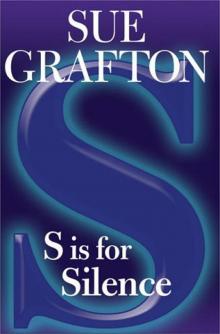 S Is for Silence
S Is for Silence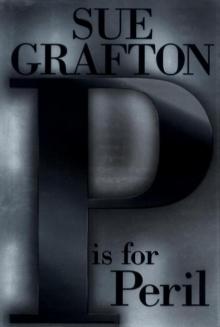 P Is for Peril
P Is for Peril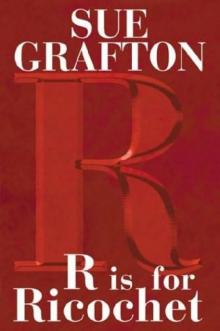 R Is for Ricochet
R Is for Ricochet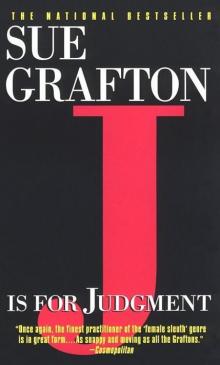 J Is for Judgment
J Is for Judgment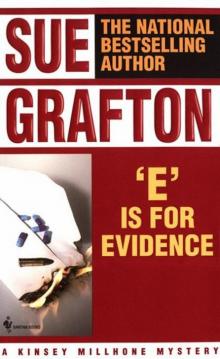 E Is for Evidence
E Is for Evidence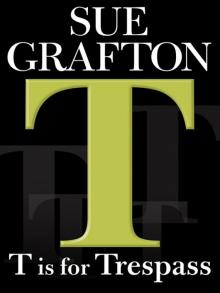 T Is for Trespass
T Is for Trespass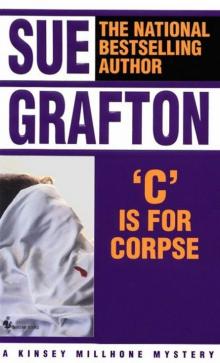 C Is for Corpse
C Is for Corpse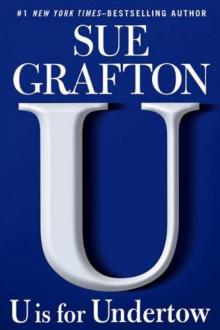 U Is for Undertow
U Is for Undertow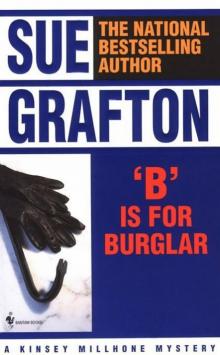 B Is for Burglar
B Is for Burglar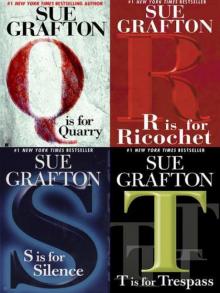 Four Sue Grafton Novels
Four Sue Grafton Novels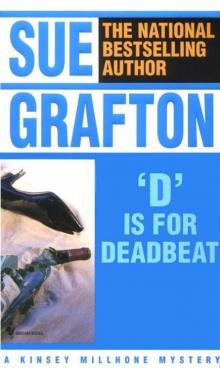 D Is for Deadbeat
D Is for Deadbeat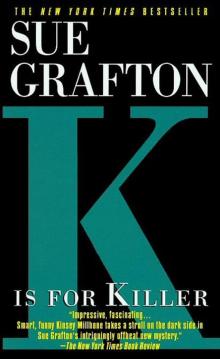 K Is for Killer
K Is for Killer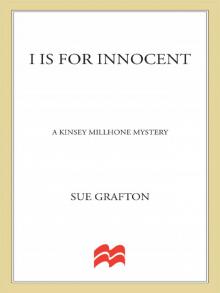 I Is for Innocent
I Is for Innocent A Is for Alibi
A Is for Alibi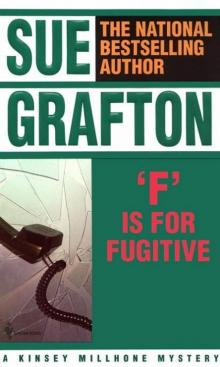 F Is for Fugitive
F Is for Fugitive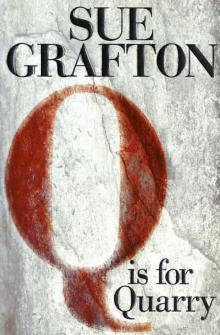 Q Is for Quarry
Q Is for Quarry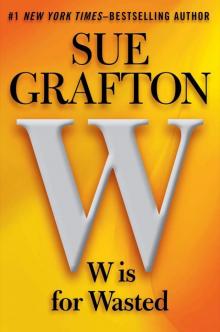 W Is for Wasted
W Is for Wasted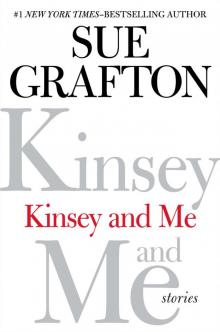 Kinsey and Me: Stories
Kinsey and Me: Stories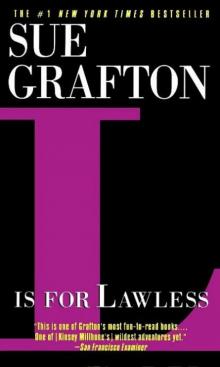 L Is for Lawless
L Is for Lawless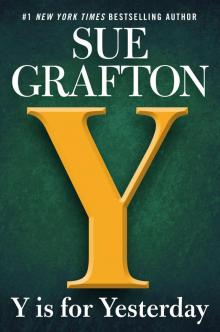 Y Is for Yesterday
Y Is for Yesterday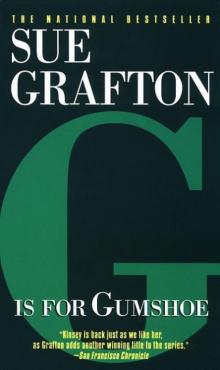 G Is for Gumshoe
G Is for Gumshoe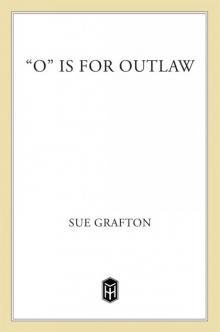 O Is for Outlaw
O Is for Outlaw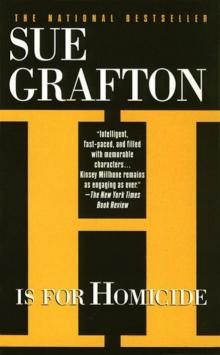 H Is for Homicide
H Is for Homicide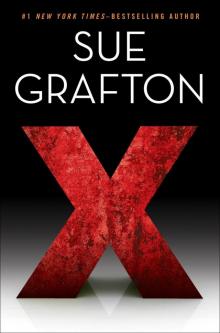 X
X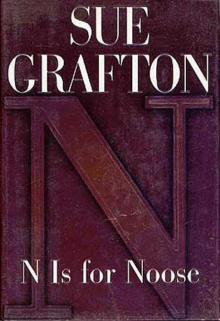 N Is for Noose
N Is for Noose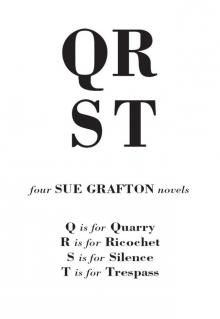 Three Complete Novels: A Is for Alibi / B Is for Burglar / C Is for Corpse
Three Complete Novels: A Is for Alibi / B Is for Burglar / C Is for Corpse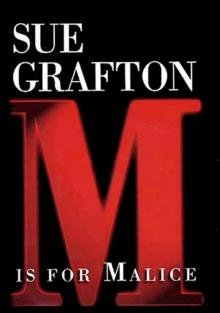 M Is for Malice
M Is for Malice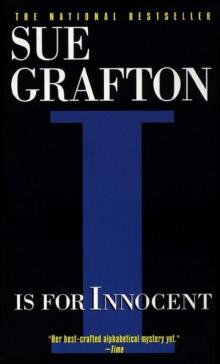 I is for INNOCENT
I is for INNOCENT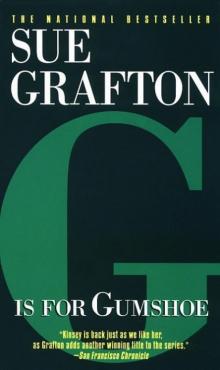 G is for GUMSHOE
G is for GUMSHOE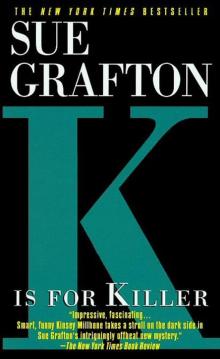 K is for KILLER
K is for KILLER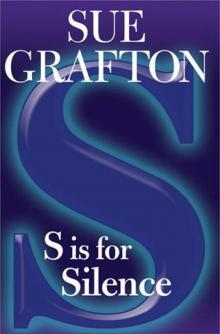 S is for SILENCE
S is for SILENCE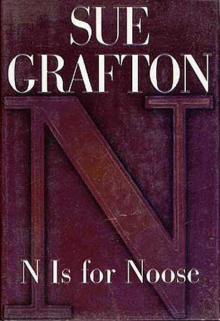 N is for NOOSE
N is for NOOSE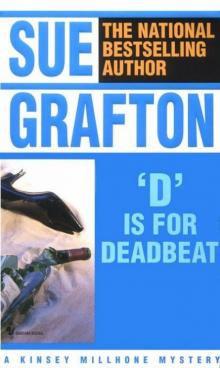 D is for DEADBEAT
D is for DEADBEAT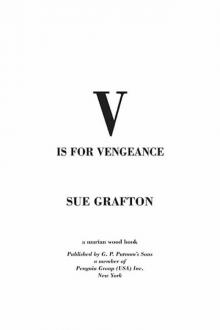 V is for Vengeance
V is for Vengeance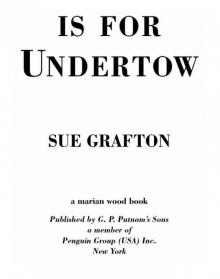 U is for Undertow
U is for Undertow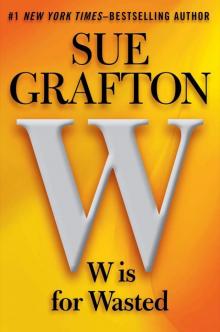 W Is for Wasted km-23
W Is for Wasted km-23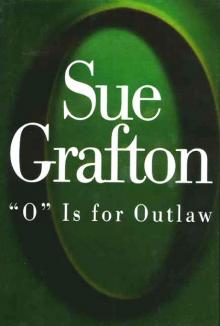 O is for OUTLAW
O is for OUTLAW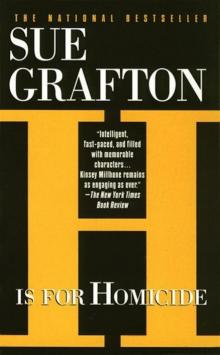 H is for HOMICIDE
H is for HOMICIDE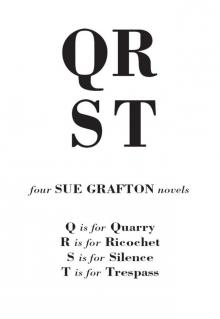 Sue Grafton Novel Collection
Sue Grafton Novel Collection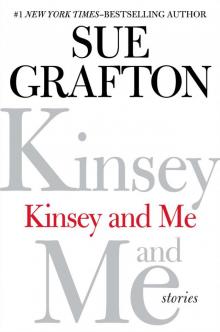 Kinsey and Me
Kinsey and Me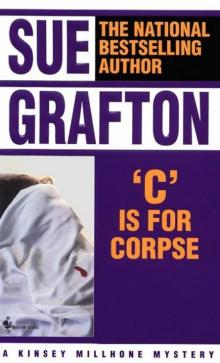 C is for CORPSE
C is for CORPSE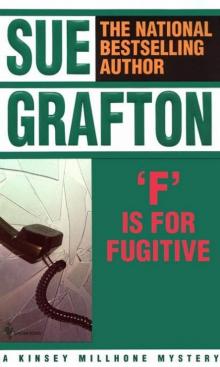 F is for FUGITIVE
F is for FUGITIVE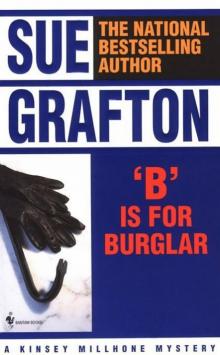 B is for BURGLAR
B is for BURGLAR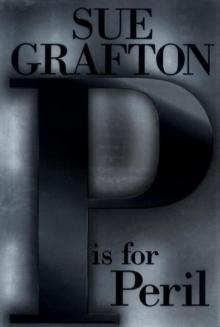 P is for PERIL
P is for PERIL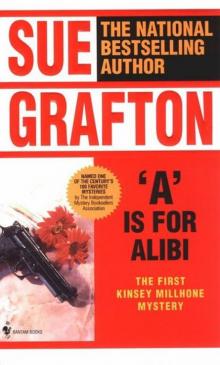 A is for ALIBI
A is for ALIBI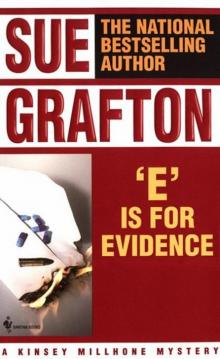 E is for EVIDENCE
E is for EVIDENCE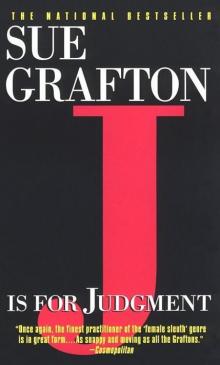 J is for JUDGMENT
J is for JUDGMENT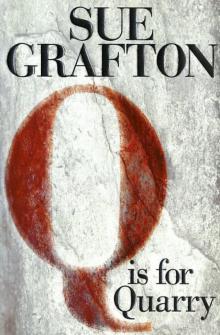 Q is for QUARRY
Q is for QUARRY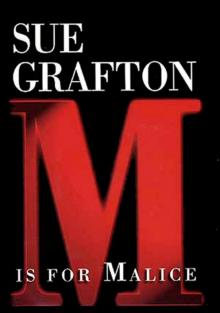 M is for MALICE
M is for MALICE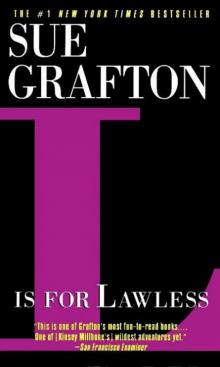 L is for LAWLESS
L is for LAWLESS